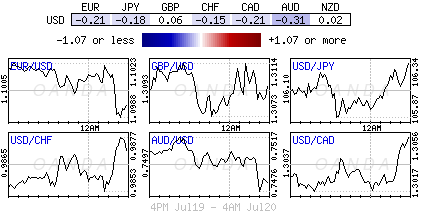Wednesday July 20: Five things the markets are talking about
Capital markets are on the move despite the waiting game for monetary policy direction from Tier I central banks over the next few weeks (ECB tomorrow).
In yesterday’s session, the Dow ended slightly above its record high close for the sixth consecutive day, but the NASDAQ and S&P 500 were down as markets pared some of their gains required during last week’s ‘risk-on’ trading event. Treasuries are rallying as commodities decline, and the US Dollar Index straddles its four-month high on market expectations for a possible Fed hike this year.
The IMF has again entered the fray and cut its global growth forecasts for the next two-years, citing uncertainty over Brexit. The Fed aside, its either “lower for longer” or more stimuli required over the next few weeks from G10 central banks. Those decisions are expected to dominate trading direction.
1. Dollar gains across the board, but….
Trading ranges do dominate.
The mighty “buck” continues to find support and has gained broadly this week after recent firmer U.S. data makes a Fed rate hike more likely.
With the market continuing to reprice Fed rate hike probability (Fed funds for Sept +18%, Dec +39.8%) the dollar index has managed to hit its highest level in more than four-months.
Overnight, the EUR briefly probed its three-week low just under the €1.10 level. Nonetheless, the markets focus will now turn to tomorrow’s ECB meet where policy makers are expected to follow the BoE’s example and take a “wait and see stance” for now, but Draghi’s tone will be closely watched in the post Brexit environment.
USD/JPY (¥106.50) continues to trade up on rate differentials (BoJ expected to provide some stimulus on July 29), while sterling (£1.3183) has found some support after U.K. labor market data this morning showed a smaller-than-expected rise in the claimant count for June (+0.4k vs. +4.1k). The U.K unemployment rate for May also came in at +4.9%, below forecasts for +5%.
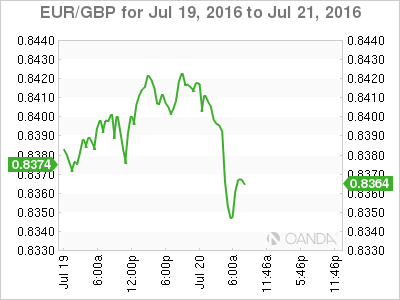
2. Bonds prices, up or down?
In the U.S, both the bull and bear bond camps have attracted new support. The latest weekly JPMorgan (NYSE:JPM) survey shows the share of investors expecting higher bond prices has risen to +26% from +18% a week ago while those expecting declines climbed to +16% from +11%.
U.S. 10-Year Treasury yield (+1.56%) has ticked up from its record low (+1.366%), and last week recorded the biggest one-week rise in more than a year. Few expect a big rise in bond yields. U.S. Treasury bonds remain attractive with a record amount of negative-yield sovereign debt in Japan and Europe.
Providing support for European debt this week (Bunds -0.03%) was yesterday’s disappointing report from Germany on business confidence. The headline print, from the largest economy in the eurozone, fell to the lowest level in four-years (ZEW -6.8 vs. 8), pointing to the impact from the U.K.’s vote to leave the EU last month.
Market participants remain cautious ahead of tomorrows ECB meeting, especially now that the IMF have cut growth forecasts.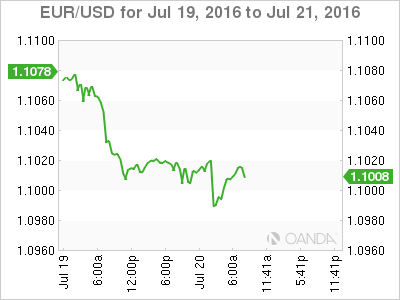
3. Global bourses mixed reviews
Global equity markets remain mixed as macro themes of slowing global growth and better than expected U.S earnings from top tech and financial names continue to dominate proceedings.
Ahead of the U.S open, Euro equity indices are trading higher paring back losses seen in yesterdays trading, in continuation of the general risk-on sentiment seen post-Brexit. However, expect the market to remain cautious ahead of the tomorrow’s ECBs policy announcement, especially after the IMF cuts its global economic growth forecast to +3.1% from +3.2%.
Commodity and mining stocks are leading the losses in the FTSE 100, while financial and tech names are leading the gains in the Eurostoxx. Expect a plethora of U.S earning reports to influence market direction.
Indices: Stoxx50 +1.0% at 2,963, FTSE 100 +0.5% at 6,729, DAX +1.2% at 10,096, CAC 40 +1.2% at 4,382, IBEX 35 +1.0% at 8,566, FTSE MIB +0.8% at 16,800, SMI +0.8% at 8,178, S&P 500 Futures +0.3%
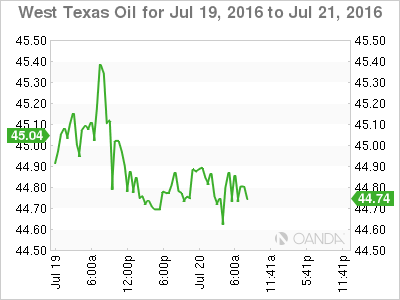
4. Commodities
Crude Oil prices are edging higher this morning, supported by expectations that U.S. crude inventories contracted last week. Nevertheless, expect these gains to remain constrained by the elevated stock scenario.
Brent crude is up +0.4% to $46.86 a barrel, while WTI futures are trading up +0.2% at $44.74 a barrel ahead of the U.S open.
Crude’s oversupply is expected to continue its snowball effect, as the “glut” will be processed into a glut of gasoline and other fuels.
Again, the market is expected to take direction from today’s EIA report – dealers will assess inventory levels and whether the recent price rally has stoked shale players to ramp up output, if so this will delay the much-needed rebalancing in the still-over supplied market.
Investors need to focus more of their attention on how gasoline and distillate stock levels have changed, not just crude levels. Dealers expect a drawdown of -1.7m barrels last week, while gasoline inventories declined by -100k barrels and stocks of distillates rose by +700k.
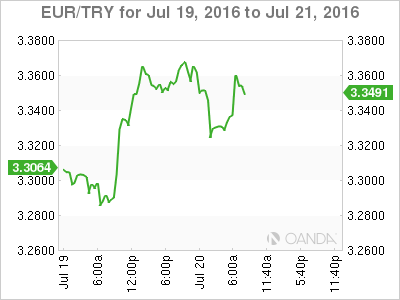
5. Turkey cuts interest rates
It was not too much of a surprise to the market to see Turkey’s central bank cut one of its key rates for the fifth consecutive month after last week’s coup triggered fears about possible repercussions for the country’s economy.
The MPC have cut the overnight lending rate to +8.75% from +9%. It kept its benchmark one-week repo rate steady at +7.5% and its overnight borrowing rate at +7.25%.
Turkish policy makers have trimmed the ceiling of the interest rate corridor from 10.75% over the past five months, capping borrowing costs for Turkish lenders in an attempt to help support economic growth.
The central bank stressed that market developments will be closely monitored and that necessary liquidity measures will continue to be taken to support financial stability.
The central bank’s rate move came after policy makers Sunday announced a series of measures in a bid to calm investors after the failed coup attempt.
TRY ($3.0271) continues to trade under pressure, unable to recover from its initial -5% slide against the dollar on Friday. Capital markets are concerned with President Erdogan and how he is rapidly consolidating his power by removing his opponents after the failed coup.
